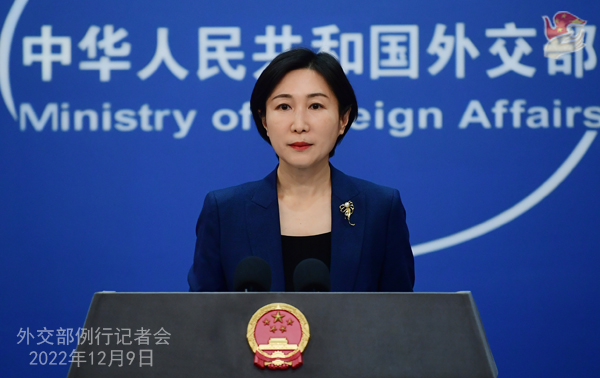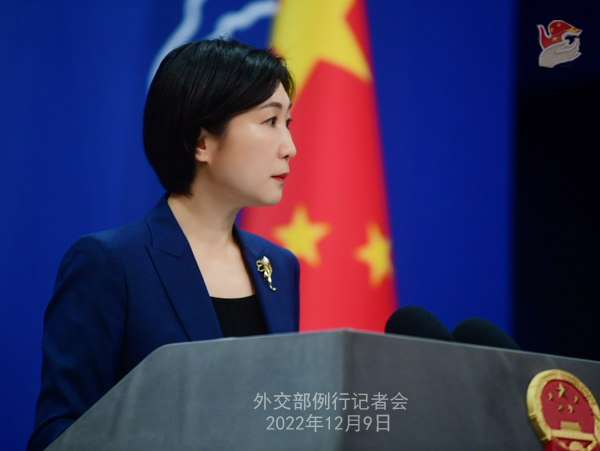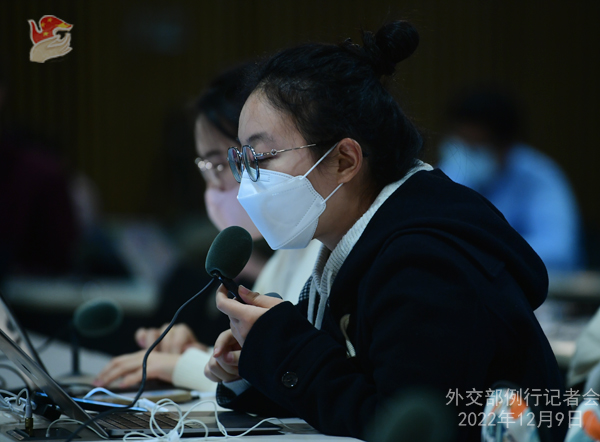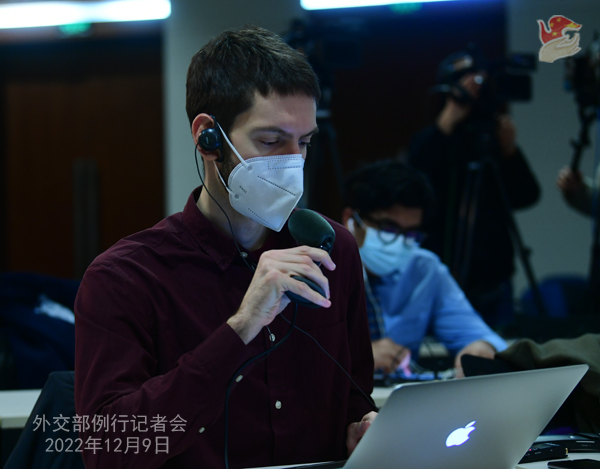| Foreign Ministry Spokesperson Mao Ning’s Regular Press Conference on December 9, 2022 |
| 2022-12-09 18:03 |
|
The Paper: We noted that the first RMB cross-border payment transaction between Saudi Arabia and China’s Yiwu city, known as “the world’s supermarket”, was completed ahead of the first China-Arab States Summit. Do you have any comment? Mao Ning: I also noted this good news. The cross-border RMB payment has played an important role in boosting trade between China and Arab states. This is also a telling snapshot of trade and investment facilitation between both sides. Over the past decade, China-Arab states economic and trade cooperation has scaled new heights. China is Arab states’ biggest trading partner. In 2021, China’s FDI stock in Arab states hit $23 billion, a 2.6 times increase over 10 years. The trade volume topped $330.3 billion, 1.5 times more than 10 years ago. In the first three quarters of 2022, China-Arab states trade reached $319.295 billion, up 35.28 percent year on year and close to the total of the whole year of 2021. During his trip to Saudi Arabia, President Xi Jinping expressed China’s hope to level up trade, investment and financial cooperation and expand cooperation in such areas as e-commerce and digital economy with Saudi Arabia. We are confident that this visit will boost sustained, solid progress in China-Saudi Arabia cooperation for mutual benefits of higher quality and at a deeper level. TASS: The US is set to levy fresh sanctions against China for its alleged human rights abuse and support for alleged illegal fishing in the Pacific, according to officials familiar with the matter cited by the Wall Street Journal. Do you have any comment? Mao Ning: I am not aware of the specifics you said. I would like to say, as a principle, that China strongly opposes interference in other countries’ internal affairs under the pretext of human rights. The US is in no position to impose unwarranted sanctions on other countries or act as a “world policeman”. China will act resolutely to safeguard its lawful rights and interests. As for the issue of illegal fishing, let me say that China is a responsible fishing country. We have always worked with other members of the international community to crack down on illegal, unreported and unregulated fishing, and have done a lot in effectively combating illegal fishing. In contrast, the US seiners are operated on the high seas for far more days than the limit set by the relevant fisheries organizations, and they have been doing this for many years. Pointing fingers at others while turning a blind eye to its own violations is blatant double standards.
China Daily: More than 100 young Chinese-language learners and enthusiasts from Saudi Arabia wrote a letter to President Xi Jinping recently to share their gains from and thoughts on learning the Chinese language. They expressed their wish to learn more about China. Do you have any comment? Mao Ning: The exchange and mutual learning between the Chinese and Arab civilizations date back more than 2,000 years. We have traded goods, sparked innovation and shared ideas, leaving a splendid chapter in engagement and mutual learning across continents. In recent years, the China-Saudi Arabia comprehensive strategic partnership has grown rapidly, cooperation in various areas keeps expanding, and Saudis have developed great enthusiasm towards learning the Chinese language and getting to know China. These Chinese-language enthusiasts are the future of exchanges between Chinese and Arab civilizations. As President Xi Jinping wrote in his reply to those young Saudis, learning each other’s languages and understanding each other’s history and culture will help promote mutual understanding and forge closer bonds between the two peoples. To date, Saudi Arabia has included the Chinese language in its educational system, set up majors related to the Chinese language in nine universities and provided optional Chinese language courses in eight middle and primary schools. And over 40 Chinese universities teach Arabic as a major. As China and the Arab world further deepen cultural exchanges, more and more young people will learn each other’s cultures and become envoys for promoting the friendship between China and the Arab world. Beijing Youth Daily: According to reports, US Department of State Spokesperson Ned Price said on December 8 that “Special Representative for the DPRK Sung Kim held a videoconference on December 7 with PRC Special Representative on Korean Peninsula Affairs Liu Xiaoming to discuss the DPRK’s increasingly destabilizing and escalatory behavior”. Can you confirm that? Could you share more details with us? Mao Ning: The Chinese side maintains communication with all parties concerned on the issues of the Korean Peninsula. We hope all parties will face squarely the crux and history of the issues of the Peninsula and address each other’s concerns in a balanced way, particularly the DPRK’s legitimate concerns.
Shenzhen TV: It is reported that on December 7, German Health Minister Karl Lauterbach has granted a permit allowing Chinese nationals in Germany to receive Sinovac COVID-19 vaccine. The decision was made based on an assessment by the Paul Ehrlich Institute (PEI) which believes China’s Sinovac COVID-19 vaccine is safe enough. What is China’s comment? Will China allow German nationals in China to receive German vaccines? Mao Ning: We welcome Germany’s decision. China and Germany have reached agreement on providing German vaccines for German nationals in China, and relevant arrangement will be discussed and determined by the two sides through diplomatic channels. AFP: The US House of Representatives just passed a defense spending bill that includes up to $10 billion in military grant assistance for Taiwan over the next five years. Do you have any reaction to that? Mao Ning: We firmly reject inserting negative content about China into the National Defense Authorization Act (NDAA). Taiwan is China’s Taiwan, and the Taiwan question is purely China’s internal affair. The US side needs to abide by the one-China principle and the provisions of the three China-US joint communiqués, remove the negative content about China from the bill, stop playing the Taiwan card and using Taiwan to contain China, stop military contact with Taiwan, and refrain from further undermining China-US relations. China will take all necessary measures to resolutely uphold its sovereignty and security interests. AFP: Canada’s federal police on Thursday suspended a contract with a company to supply and maintain Canadian police radio equipment. This company is called Sinclair Technologies but is controlled by a Chinese company. There are some concerns in Canada about potential Chinese access to Canadian police communications. Do you think these concerns are justified? Mao Ning: We have noted relevant reports. China and Canada are both beneficiaries of economic globalization and should jointly reject politicizing economic issues or overstretching the concept of national security.
|



